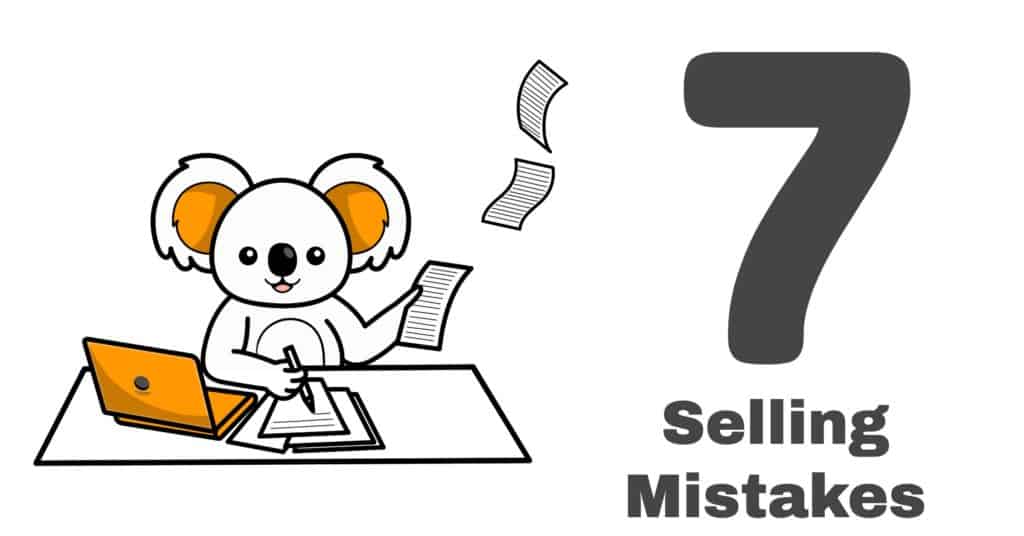Are you making these mistakes?
Selling your property is a stressful process. Afterall, there is often a lot of money at stake. Because one mistake can prove costly, we compiled a list of common mistakes we see and hope you avoid.
Mistake 1:
They Don’t do market research
We cannot emphasise how important this first step is. Before you start the process of selling your house you must have an idea of how much your house is worth. If you don’t you could ask too much for your house and be frustrated that it isn’t selling. Conversely, you might not ask enough and sell too cheaply.
Either way, not having a really good idea of what your property is worth can cost you thousands.
Your real estate agent will give you a good guide but don’t rely solely on their opinion. You must understand what comparable properties in your area are selling for.
But how do you research the market?
Here are some sources of information to help you work out what your property is worth:
- Local real estate agents. Many good real estate agents can provide you with a suburb snapshot which will give you a guide on the average selling price in the area, recent price trends and the volume of properties recently sold. You can also ask for a list of recently sold properties and their price. This will be invaluable in helping you form a view of your property’s value. Good agents will definitely help you with this.
- Online websites. Websites like propertyvalue.com.au can give you a guide and also tell you what price the property was last sold for.
- Valuations: Of course, you could invest some money to get a professional valuation to give you another data point.
Importantly, as you look at all this information, be realistic about your property. We know you love your house and think it’s in great condition but potential buyers might think otherwise. There can be a big difference in the price of an “ok” condition property versus one that is brand new and in excellent condition.
The other reason market research is critical leads us to the next mistake people make.
Mistake 2:
Not properly preparing your home
Most people just jump right into preparing their home for sale by cleaning up, painting and making some repairs.
Before you do this you must think about how you want to position your property in the market. Here are some of the questions we asked when we sold our property:
- Is our property a renovators delight (e.g. poor condition and needs a lot of work) or is it in excellent condition or could be quickly cleaned up to look like it’s in excellent condition?
- In the research we did above, is there a market for a renovators delight or do people tend to want to buy properties in excellent condition?
These sorts of questions tease out how you should prepare your property.
For example, let’s say your house was very old, not in great condition, poorly laid out and needed a serious investment to put it in the “excellent condition” category. We have seen some smart property investors decide to leave these types of properties in their original condition and simply clean them out so potential buyers can see the proper size of the rooms and gardens.
This strategy targets buyers who dream of doing a full renovation of a property to get the exact dream home they want or property developers. It can work really effectively if you have done your research well.
Another example is a personal one. After doing research of the local market we realised that there was a strong demand for “perfectly presented” homes. Our property was in good condition but wasn’t perfect as it had been over 10 years since we last renovated. It was structurally really good but needed new paint, carpets etc.
We quickly did some numbers and worked out that for around $30,000 we could paint the house inside and out, polish the floorboards, replace the carpets, fix those leaky taps, the hot water system and a few other minor cosmetic repairs (how do kids make so many holes in plaster walls?).
This was the smartest thing we did. We suddenly opened up our market to this higher end buyer which generated more competition on auction day and we ended up getting at least $150,000 more for our home.
It’s important to do your numbers and make sure you don’t over capitalise. It all starts with good research and thinking about who you are going to sell to and how you can create the most competition for your home.
Other key points to remember when presenting your home:
- Regardless of who you are targeting make sure to declutter the property. Clear out rooms of excess furniture and clean up the garden. This will make the whole property feel much more spacious.
- De-personalise. Remove those pictures of your family and mum and dad! You want buyers to think about how they might live in the house not that it’s someone else’s house!
- Make minor repairs. That hole in the wall may not seem important but it’s the sort of thing that really puts buyers off.
- General freshen up. If you do decide to really present your house well paint it inside and out, polish those floor boards and replace the carpet. It’s not a massive expense but makes a really big difference for potential buyers.
Mistake 3:
Lack of marketing
The key to getting a great price for your home is to have competition. If you’ve only got one potential buyer then your agent is going to have to work really hard. If you’ve got many buyers the price tends to look after itself!
Don’t just put up an advertising board at the front of your property and print some letterbox flyers. Invest in digital marketing with listings on real estate websites and think through other places your target customer searches for information. A good investment in marketing can make a massive difference to the outcome.
To support your marketing efforts make sure you invest in professional photo’s. Have you ever looked at a property online with photo’s from an iPhone? They look pretty bad and are a real turn off for potential buyers.

Can you save on your home loan?
Mistake 4:
Choosing a poor real estate agent
First of all, don’t sell the property yourself unless you are super confident at negotiating and a really good marketer. Being able to expertly negotiate can significantly impact the final price and can be well worth the fee you pay an agent.
A good agent will also have a wealth of local knowledge and have their finger on the pulse of the current market. The information they provide you will be invaluable.
So, getting a real estate agent is important but how do you find a good one?
When it comes to choosing an agent we are big believers in doing research. This is how we find great agents:
- Go to lots of open for inspections (you’ll need to do this as part of your price research anyhow). You’re looking for the following:
- which agents are good at taking your details in a friendly way?
- which agents seem to be able to connect with people easily?
- which agents seem good at building trust fast?
- which agents are excellent at follow up? You want an agent who is very good at keeping in touch with buyers through the sales process. Some agents aren’t’ really good at this and we would recommend you steer clear of them. The agents that follow you up and keep you in the loop through a purchase process are the ones you want.
- If you decide to go to auction you should also look for a good auctioneer. They are often different to the agent that runs the open for inspections. A good auctioneer really presents the property well on auction day, knows how to handle aggressive bidders and knows how to generate tension and competition on auction day.
Choose your agent carefully and you’ll have a great chance of a good outcome.
Mistake 5:
Not having a good relationship with your agent
Many people distrust real estate agents but we couldn’t disagree more. As in any profession there are some shonky ones, but if you have done your research and found a good one you should really embrace them!
An open dialogue can really help you get the outcome you want and you’ll be amazed at how much knowledge they have that helps the process.
Mistake 6:
Not choosing the right sales method (auction vs private treaty vs online)
Really carefully consider the sales method of your property because it could have a major impact on the final price you achieve.
Do you go for a big auction day with people bidding or simply put the property on the market and negotiate as people show interest?
Do your research on the local market and see how most properties in your area are sold. Some areas of Melbourne love an auction with people bidding at the property while other areas of Australia prefer selling through negotiation.
Consult with your agent and get their thoughts.

Can you save on your home loan?
Mistake 7:
Not being flexible to allow more buyers to compete
Through the sales process you may get people asking for things like a longer settlement period or flexible deposit terms. Rather than just say no, really take the time to consider these requests and if they fit your situation. Remember, you need to have as many potential buyers as possible so a little flexibility can help create a lot of competition for your property.
Selling your home is a really big deal and spending some time avoiding these mistakes could help you get a great outcome.


